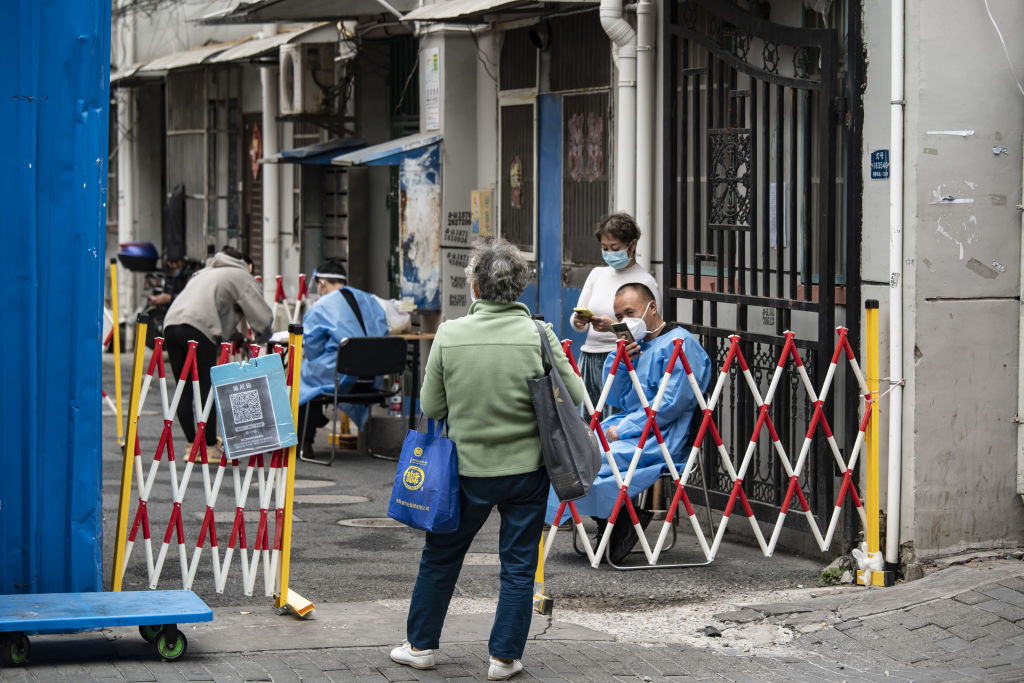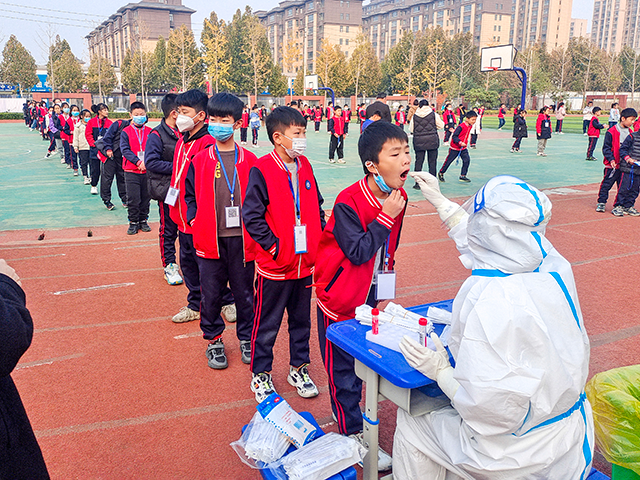China’s mega-city of Guangzhou, which became the “epicenter” of the current Chinese coronavirus outbreak this week, announced on Thursday it would shutter schools and universities.
Several other cities posted record-high daily infections, including Beijing. Although the Chinese Communist Party has admitted no errors with its heavy-handed “zero-Covid” lockdown policies, health officials rushed to reassure the public that some draconian restrictions would be lifted and citywide lockdowns would be avoided.
China’s state-run Global Times fumbled to explain the “complicated and severe epidemic situation” in Guangzhou, where the “source of some sporadic positive cases was not clear,” “the risk of community transmission was high,” and “infections have now burst out in multiple points.”
“After China shortened the quarantine period for people entering the country from overseas to ‘7+3’ days in the middle of this year, some voices attributed the latest surge in Guangzhou infections to the border entry measures, arguing that it would be better to extend the quarantine time,” the Global Times wrote.
Although the outbreak in Guangzhou has slowed down the pace of the metropolis, most local residents have felt the city's strong management abilities and humane care as daily supplies&medical resources are sufficient, anti-epidemic measures are targeted. https://t.co/hjgi3J2i6W
— Global Times (@globaltimesnews) November 10, 2022
The “7+3” quarantine plan for travelers was one of the first relaxations of strict coronavirus policy made by the Chinese government. The name refers to seven days of hotel quarantine followed by three days of self-monitoring for travelers. On Friday, the National Health Commission (NHC) reduced the requirement further to 5+3 as part of a 20-point plan that also backed away from mass coronavirus testing.

Workers in personal protective equipment (PPE) at a neighborhood placed under lockdown due to coronavirus in Shanghai, China, on Wednesday, October 26, 2022. (Qilai Shen/Bloomberg via Getty Images)
The new coronavirus guidelines from NHC also put an end to the onerous practice of tracking “secondary contacts” with infected people and lifted financial penalties against airlines for carrying too many infected passengers.
“Optimizing and adjusting prevention and control measures is not relaxing prevention and control, let alone opening up and ‘laying flat’, but to adapt to the new situation of epidemic prevention and control and the new characteristics of [Chinese coronavirus] mutation,” the NHC said defensively when rolling out the new guidelines. “Laying flat” is a Chinese euphemism that means “slacking off.”
China's current covid epicentre Haizhu in Guangzhou going into hard lockdown, record daily case tally in Beijing, countrywide cases over 10K and authorities re-state commitment to zero-covid but more 'dynamic' targeted measures to limit economic impact ♾ https://t.co/u3aZ65uXAd
— Debi Edward (@debiedwarditv) November 11, 2022
The Global Times reassured readers that Guangzhou residents remain confident in their city’s “strong management abilities and humane care.”
“Daily supplies and medical resources are still sufficient, anti-epidemic measures are targeted and dynamic and the one-size-fits-all approach in controlling the epidemic is barely seen,” the Global Times asserted, addressing the top concerns that might be forming in the minds of Guangzhou residents as they recall the lockdown horrors in other cities.
“Despite the mounting pressure, the city is following a scientific and people-oriented principle during the epidemic,” said Guangzhou medical expert Zhuang Shilihe. Promising a people-oriented approach instead of one-size-fits-all is the Communist Party’s way of saying “this won’t be like Shanghai” without admitting the Party did anything wrong in Shanghai.
The Chinese government announced 10,535 new infections on Friday, the highest number since the Shanghai lockdown began. Guangzhou declared over 2,000 infections for the fourth day in a row, most of them in a densely-populated district called Haizhu that has been subjected to a hard “stay at home” lockdown.
Zhengzhou, home of the massive and tormented Foxconn plant for assembling iPhones, said its cases doubled to almost 2,988 a day, while Beijing reported a daily record of 118 cases. The coronavirus surge was large enough to require cancellation of the Beijing Auto Show.

COMMENTS
Please let us know if you're having issues with commenting.